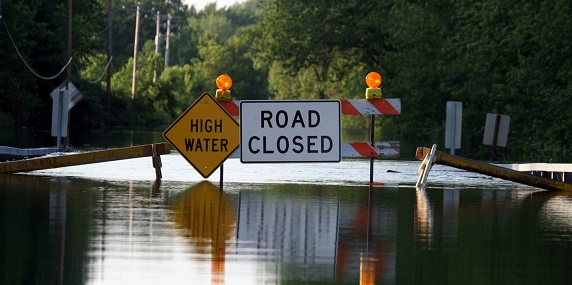Avoid driving in flooded areas and respect the power of water, ICBC advises
With the threat of more flooding in parts of B.C. this week, ICBC is urging drivers to be cautious in and around flooded areas.
ICBC recommends finding a safe location on high ground for the temporary storage of vehicles and seasonal vehicles such as motor homes, trailers or snowmobiles located in low-lying areas that may be subject to flooding.
Customers must ensure that vehicles are properly licensed and insured before they’re operated on any road or highway. Customers can purchase temporary operation permits from any Autoplan broker.
Do not store valuable goods or household items in your vehicle as these items are not covered by vehicle insurance.
Here are ICBC’s top tips for drivers in and around flooded areas:
- Floodwaters can quickly wash out roads and bridges. That’s why it’s important to be prepared and plan out an alternative route in case the road you want to use is closed. Check drivebc.ca for the latest road conditions and Emergency Info BC for up-to-date flood information.
- If you find yourself on a road that’s flooded or marked closed, don’t continue. Turn around and use another route.
- If you have no choice but to drive into water, drive slowly and cautiously. Watch carefully for signs of a moving current that may impact the safety of the road ahead. Respect the power of water.
- Think about what you can’t see – hazards such as submerged trees or downed powerlines that may be in the water. If in doubt, don’t proceed.
- After driving through deep water, always test your brakes. They may pull to one side of the other or they may not work at all. You can dry the brakes by driving slowly and applying brake pressure lightly. Other parts such as emergency brake cables, axels and electronic components should be dried and checked by a qualified professional as soon as possible.
- If your vehicle stalls on a flooded stretch of road, be prepared to abandon it and retreat to higher ground.
- Don’t try to retrieve vehicles from flooded areas until it’s safe. Wait for the water to recede.
- If your vehicle’s engine has even been partially immersed in flood water, don’t try to start it. Qualified professionals should check all operating systems and fluid levels to prevent possible future problems.
ICBC’s optional comprehensive or specified perils coverage provides customers with protection for vehicle damage caused by rising water. Customers can report a claim online at icbc.com or by calling ICBC’s Dial-a-Claim at 604-520-8222 or 1-800-910-4222.
If you’ve been placed on evacuation alert, take a few minutes to pack all of your important documents including your B.C. driver’s licence and/or B.C. services card/B.C. identification card, passport, original birth certificate, marriage certificate and Canadian citizenship document.
Protecting these valuable documents will spare you from having to replace them. It’s also a good idea to have a copy of your vehicle registration and Autoplan insurance policy.
As it’s national Emergency Preparedness Week, now’s a good time for drivers to make sure they have an emergency kit in their vehicles, especially when travelling on longer trips.






















